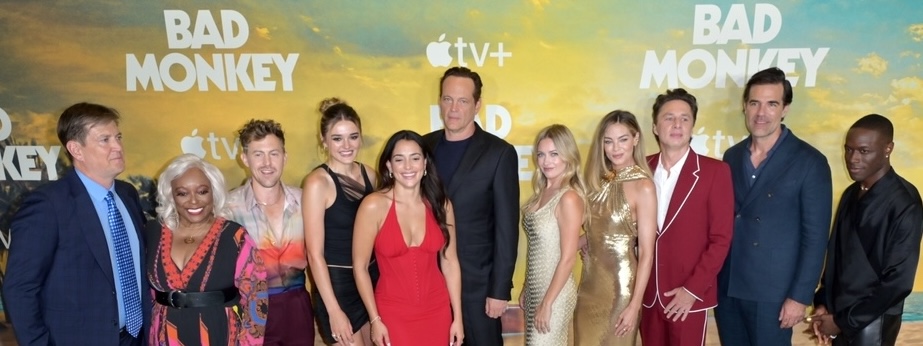I started watching Bad Monkey, the latest Apple TV+ series, one of the funnier things on offer this year, for two reasons. First, I like Vince Vaughn a lot. He was clever in his 2000s persona in comedies with Will Ferrell and Owen Wilson: Old School (2003), Dodgeball (2004), Wedding Crashers (2005). He was manly, indeed scary, in the 2010s, in Nic Pizzolatto’s remarkable True Detective season 2 (2015) and the S. Craig Zahler movies Brawl in Cell Block 99(2017) and Dragged Across Concrete (2018), with Mel Gibson. Secondly, as my faithful readers at RLO know, I keep an eye on developments in pop culture, since they showcase the ongoing mental breakdown of our taste-making elites and their audiences.
Take for example Bad Monkey co-creator Bill Lawrence, probably the best American TV maker of inoffensive middle-class humor. For almost 30 years, he’s had hits that reveal something shallow but endearing about America. Spin City(1996–2002) offered us Michael J. Fox as a deputy mayor of NYC busy reducing politics to clever media coverage. Scrubs (2001–10) gave us funny Millennial medical interns in Sacramento making their careers while indulging every bit of pop culture nonsense imaginable in the pursuit of endless adolescence.
Then everyone got older and sadder, yet the fantasy continued. Cougar Town (2009–15) is a funny view of a new America in which a 40-something divorced woman is looking for love in Florida. Ted Lasso (2020–23) brings a Midwestern American of the folksiest, most upbeat disposition, whose wife is leaving him, to coach an English soccer team, presumably because the dour English could do with a softer version of nihilism, one in which working-class Englishmen replace anger with submissive, inclusive niceness.
All these shows were hits—they make a mawkish mockery of a society falling apart, adding glamorous, implausible fun to an increasingly depressive failure in America to deal with love, friendship, and work. Lawrence is a common case: talent misspent reassuring people. A partial exception was his recent AppleTV+ show Shrinking, which I’ve reviewed in these pages, which was more honest about the narcissism and therapeutic delusions of our Californian way of life and made room for men to take themselves seriously. So, too, Bad Monkey reveals a new willingness to portray the depressive realities of the end of the TV era, when all the fantasies come crashing down around us and the prevalent mood of our endless streaming content is darkening.
Lawrence is also adapting here a Carl Hiaasen novel. Hiaasen wrote for the Miami Herald (1976–2021), mostly as a columnist, and he’s written at least 20 NYT bestselling novels, often called black comedies, set in his native Florida. The quality of his writing is easily gauged from his most famous movie adaptation, the Demi Moore movie Striptease(1996), and his recent Trump parody novel, Squeeze Me (2020), in which that president starts a witch hunt and/or crusade against an innocent and hapless illegal immigrant just trying to get by. This crass stuff passes for wit, the sign of superior intelligence with liberal audiences.
This is not impressive artistic talent, yet Bad Monkey is much better than it has any right to be, because Lawrence’s sentimentality curbs Hiaasen’s cynicism and thus allows Vaughn to explore the drama of being a man in 21st century America. He’s a detective in South Florida, Jimmy Buffett country, where nothing is taken seriously, on a case of a missing hand, investigating without authority and against the wishes of his police superiors, who have anyway suspended him. He’s forced to do health inspections—a food detective somehow fits a food-obsessed nation—and that, too, does nothing but rub his nose in the ugliness beneath our consumerism. Through it all, he somehow keeps his self-respect.
How can this guy be our hero? Both in presidential elections and in entertainment, we look for the man who can get the job done, who won’t collapse under the pressure of American life. Bad Monkey offers a comic equivalent of this problem by updating the action comedy, a genre swept away by therapy and feminism but which has lost none of its charm. Vaughn does the kind of role Bruce Willis did a generation back, the wisecracking cop, down on his luck, but incorruptible. He’s not an ordinary American—he’s bigger, bolder, cooler than we are—but he’s on the side of ordinary Americans and he won’t be played for a sucker. He embodies our outrage at BS.
But in the generation since the action comedy disappeared, things have changed. Vaughn plays a marginal figure in South Florida, Andrew Yancy. Indeed, he cannot even keep his job on the police force. Yancy chivalrously hits a husband who beat his wife (the beautiful Michelle Monaghan), with whom Yancy unchivalrously had an affair. We can’t summon the moral strength for a defense either of marriage or of men these days, so there’s no solving this conflict. Worse, adultery isn’t even a possible conflict in a story because no one takes it seriously—this isn’t Anna Karenina. Instead, Yancy gets suspended as everyone waits for things to blow over.
So it’s very hard to ever do anything risky. Both institutionally and morally, being a man is almost outlawed and certainly frowned upon. Virtues like loyalty, and Yancy is fiercely loyal to his partner and his friends, are just not that useful. They might even be a liability when it comes to lawsuits or inflexible institutional procedures. On the other hand, the romantic vices of men are harshly punished because they smack of freedom, a possible escape from a kind of bureaucratization of life. So we can only have comic heroes, but maybe they’re easier to live with. We get more comic dialogue, less action—that is, bloodshed.
Even in this more debased, funnier situation, moral seriousness and institutional authority are needed, because people still get murdered. Even funny evidence of murder—a sawed-off hand fished off the Florida coast, with a stiff middle finger—reminds us of the need for justice and the fear of evil, however unrecognizable it becomes in an unserious society. Yancy deals with all sorts of crazy people in his investigation, including institutional corruption, corrupt cops and doctors involved in Medicare fraud, and he rises in our estimation as he makes his peace with his situation and gets on with the work of protecting the weak from the vicious.
Yet there is something flat in the comedy, a sort of spiritual vacuity. Yancy’s father (played by the wonderful Scott Glenn), also a cop, has no better wisdom to offer than swimming with the manatees. That’s soft, lonely nihilism; it cannot account for the harsh things in the world or our hopes of bettering ourselves.
Yancy’s conduct suggests an alternative to that emptiness, an attempt to balance the seriousness of the job with the tenderness, often comic, of love and friendship. He adapts to his middle age awareness of mortality, making compromises with the institutional set-up of the police, stops running his mouth sarcastically, and thus becomes more serious about the pursuit of justice. This is the surprise of Bad Monkey—it’s a comedy about moral seriousness, accepting burdens, and even hints at the pursuit of nobility. I only wished to see more of Vaughn and less of the distracting side plots that offer uninspired social commentary.

